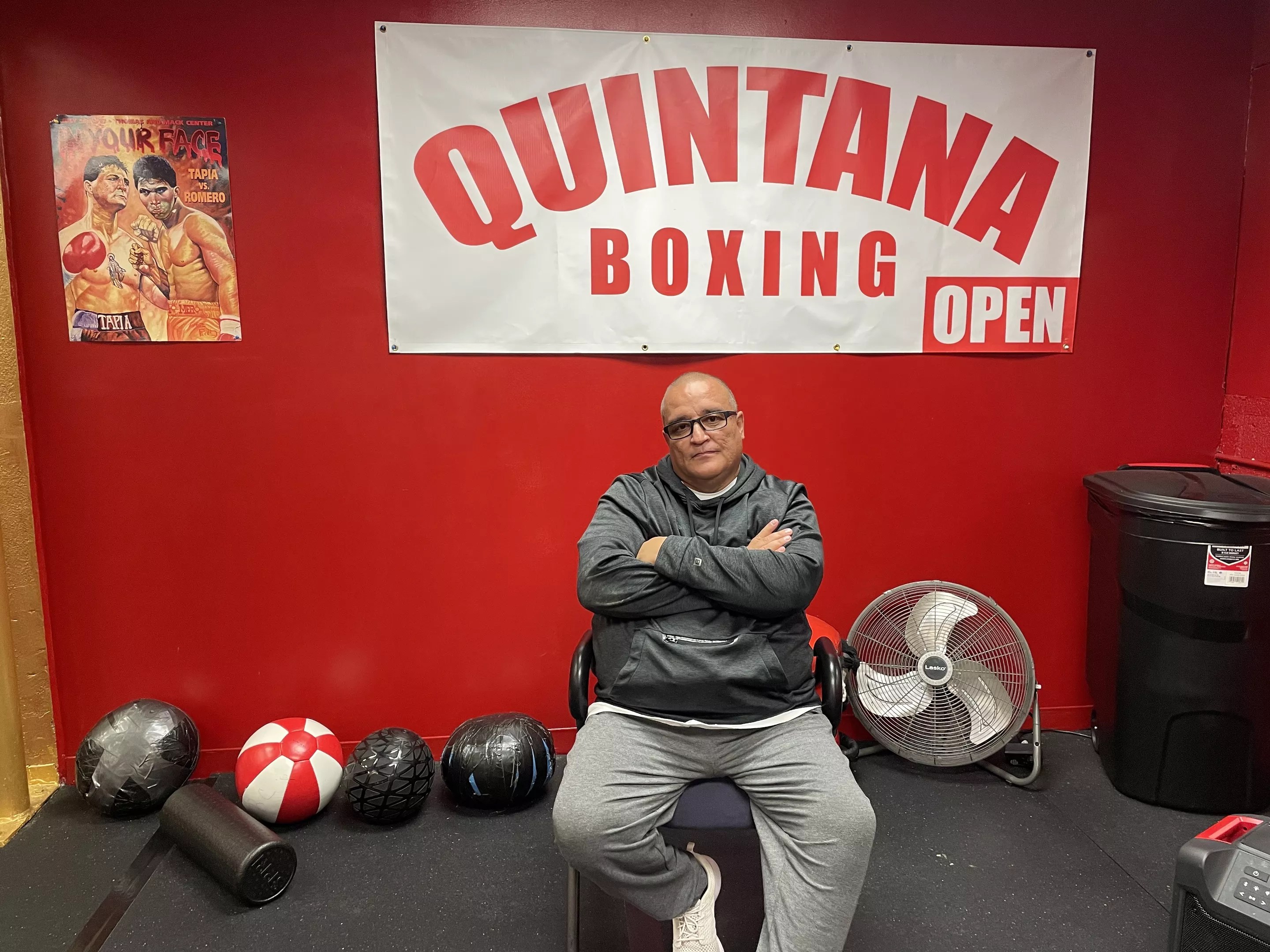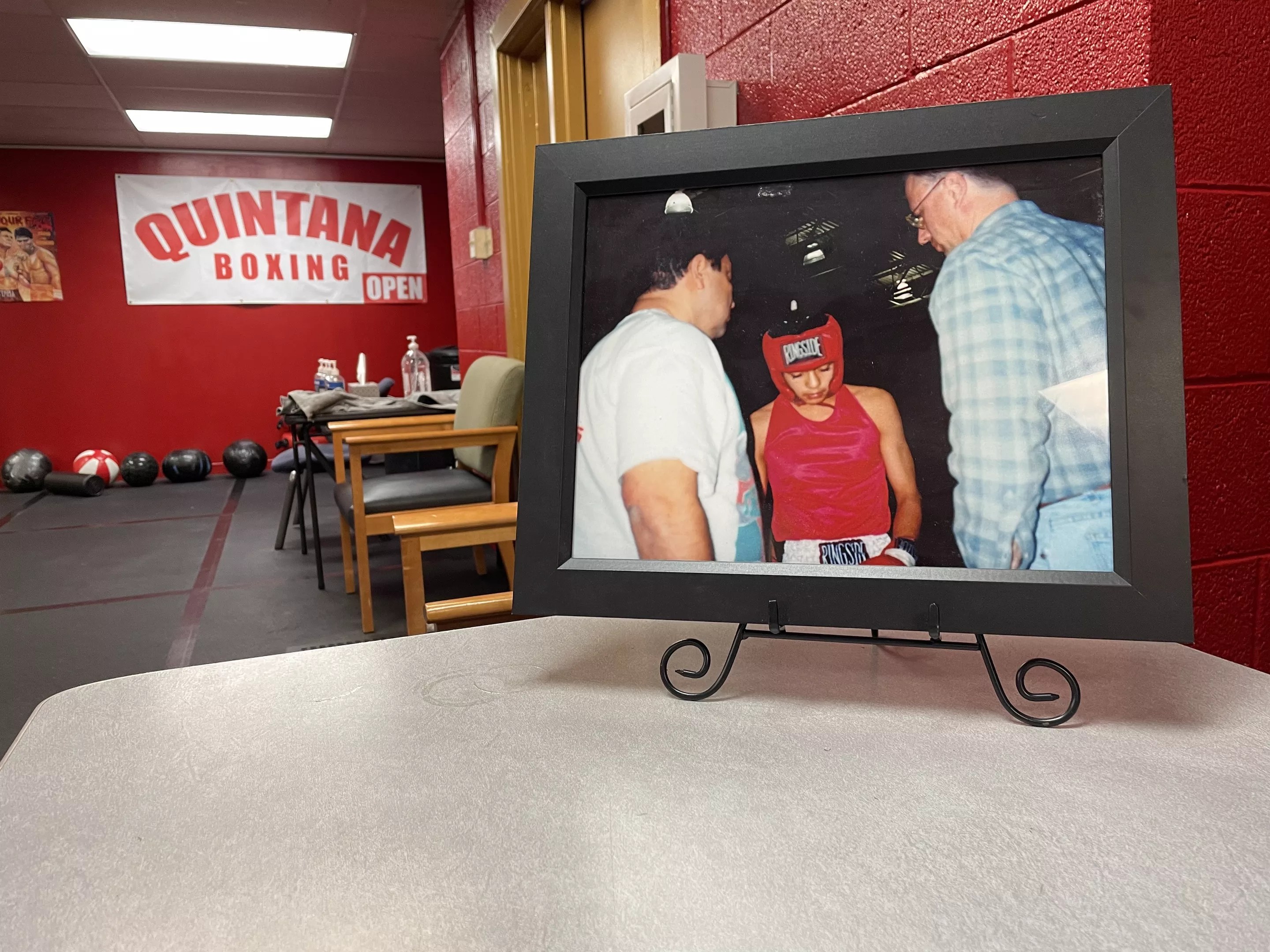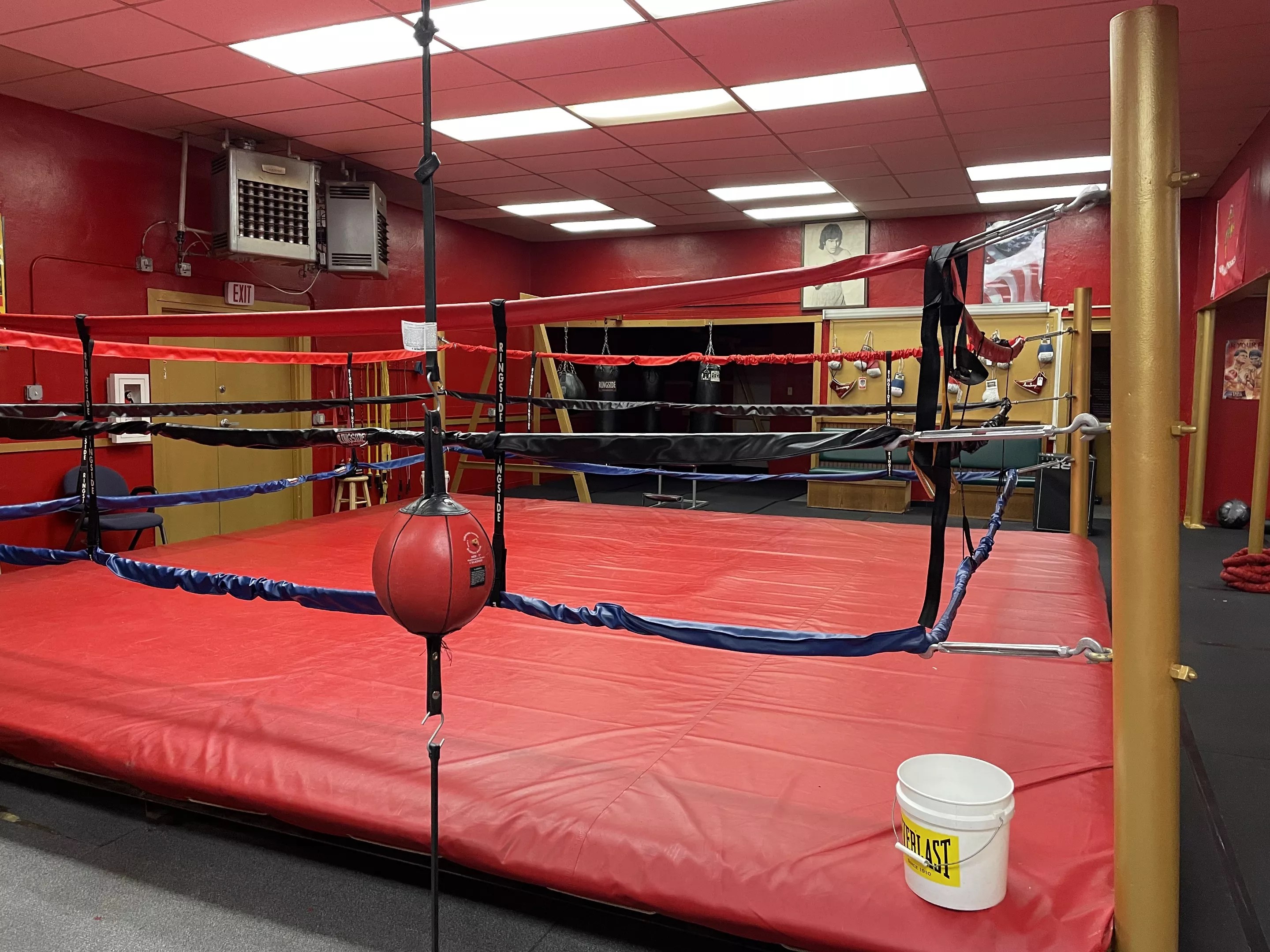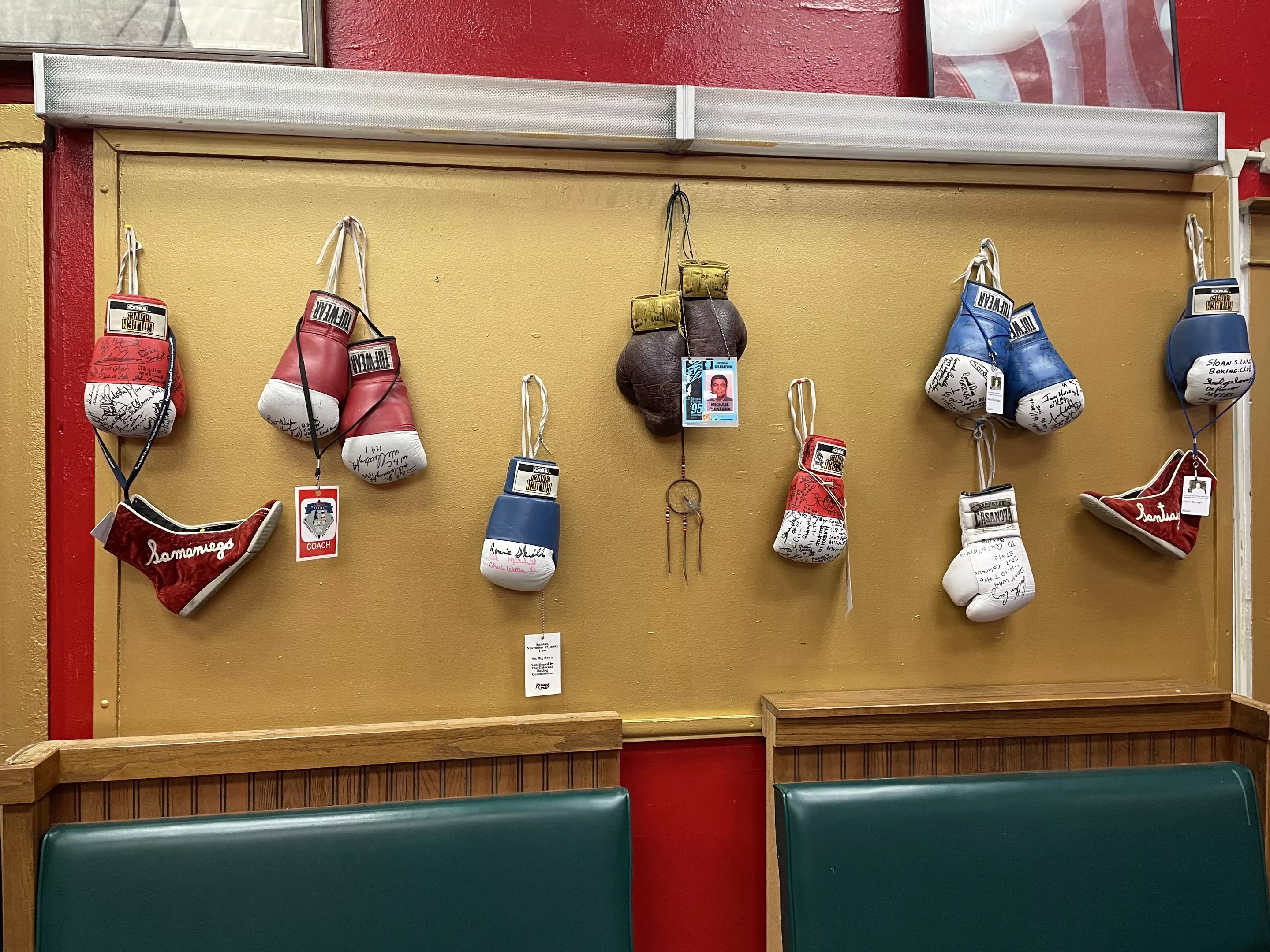
Catie Cheshire

Audio By Carbonatix
Quintana Boxing is not going down without a fight.
Since 1988, the nonprofit organization originally known as the Sloan’s Lake Boxing Club has operated out of an old gun club owned by the city at 5055 West 17th Avenue. Even as Ray Quintana passed the place to his son, Mike Quintana, who passed it to his son Mike, the club has remained a gathering place for some of northwest Denver’s youngest, and poorest, residents.
As the story goes, Ray Quintana asked then-Mayor Federico Peña if he knew of a space where he could start a boxing program for children in the area. Peña showed him the then-empty building on the southwest edge of Sloan’s Lake Park, which had been vacated by the Denver Municipal Trap and Skeet Club in 1969, and said that the Quintanas could use it for free since they’d be providing a public service. When Wellington Webb took over as mayor, he visited the gym and decided the Quintanas should pay the Denver Department of Parks and Recreation $1 per year for the space.
That was three decades ago.
Today the bright-red interior of the building is filled with a boxing ring, punching bags of every shape and size, and memorabilia depicting the club’s 33-year history. One trophy case is dedicated entirely to Andres Borrego, a Quintana relative who excelled on the junior boxing circuit. Another display houses gloves from Olympic boxers the team has encountered on its travels to tournaments across the country.
In the center of that display are the worn gloves of the first Mike Quintana. His old chair is against the wall, by the ring; no one has sat there since he died in 2018 except his widow, who occasionally visits her son at the gym.

Mike Quintana keeps memories of his father (pictured) and grandfather close.
Catie Cheshire
But by the end of May, all of this could be gone. On January 12, the second Mike Quintana received a letter from Scott Gilmore, deputy executive director of Parks and Recreation, saying that Quintana Boxing’s agreement with the city will expire on May 31, 2022, and won’t be renewed.
“It’s like I was walking down the street and he just ran me over with a bus and kept going. That’s how I feel,” Quintana says. “We did all this to this building, and now they want it after thirty-plus years. I’m shocked.”
Gilmore first visited the gym shortly before his father died, Quintana says, and encouraged him to continue the boxing program.
According to Gilmore, the agreement was always set to expire on May 31. And now the city needs the building back, because the RISE bonds that Denver voters approved last November include funding for a renovation of the Sloan’s Lake Boat House, which was built during the Depression by the Civilian Conservation Corps and is currently the headquarters for the Northwest Park Maintenance District. The $7 million project will turn the boat house into a community gathering place, and maintenance will move into the building now occupied by the gym.
“I have 270 parks in the city,” Gilmore says. “I need maintenance shops to take care of those parks. They just don’t magically get taken care of. … To be fiscally responsible for the city and to actually have a maintenance shop in this park, it makes the most logical sense to move into that location, which the city owns.”
Denver City Councilwoman Amanda Sandoval, who represents District 1, grew up in northwest Denver. When the pandemic hit, she was worried about the club because city recreation centers were shut down and the gym was the closest thing to a city rec center in Sloan’s Lake. She says she repeatedly reached out to Quintana to see if the gym wanted to take part in one of the Latino vaccination clinics she was organizing. Quintana says he didn’t respond because he thought he was supposed to deal only with Gilmore, who’d told him that he should reach out directly if he ever needed anything.
At the same time, frustrated that her district in northwest Denver hadn’t seen many big projects when other parts of the city were getting them, Sandoval was working to secure funding through the RISE bonds for the Boat House project. The Sloan’s Lake Master Plan written in 2002 had recommended that the Boat House be transformed into a community facility, and the 2009 Sloan’s Lake Irrigation Pump and Marina Master Plan describes the idea in-depth. Projects for this round of bond funding had to be part of an earlier plan, so Sandoval pursued the Boat House renovation for her district. “Never did I think that the unintended consequence of getting money for a catalytic project such as renovating the Boat House and having a public facility would mean that the Quintana Boxing club would have to be displaced,” she says.
Sandoval envisioned weddings and quinceañeras being held at the Boat House, not a longtime community program being shuttered. “With the redevelopment of St. Anthony Hospital and the buildout of that entire area, I have been hearing for years now that Sloan’s Lake needs more resources,” Sandoval adds. “I was doing the work of the people that I’ve heard from.”
Quintana says that he doesn’t blame the councilwoman, and that Gilmore “got Amanda and myself to fight when he’s to blame.”
But Gilmore points out that Quintana has communicated with other members of the parks staff over the years, so he knew that he could speak with people. And he suggests that Quintana, like any other Denver citizen, could have participated in the public meetings where potential bond projects were discussed.
In the final plans describing how bond dollars would be used, the city says it considered racial equity because “publicly subsidized and accessible event spaces provide affordable options to lower income residents who may not have access to privately-owned spaces.” Quintana says that’s what his gym has been doing for more than three decades.
After receiving Gilmore’s letter, Quintana requested a meeting with Happy Haynes, executive director of Denver Parks and Recreation. She had no idea the club even existed, he says. And while Haynes and Gilmore agreed to look for other places where the program could move, they haven’t identified any.
“We have to do what’s best for the park and the overall community, and not just one organization,” Gilmore says. “For ten years, I’ve really tried to help support his program. I tried to make sure the building was taken care of and improved.”

Quintana Boxing has a fully-equipped ring.
Catie Cheshire
After the meeting, Quintana’s niece started a petition urging the city to let Quintana Boxing keep its current home and help keep youth off the streets. It already has over 500 signatures. The fight won’t stop there; Quintana plans to contact Mayor Michael Hancock and perhaps protest outside of Gilmore’s house.
Quintana, who describes himself as “boisterous,” had used that tactic before. When teenagers tagged the gym in 1998, he staged a rally outside the home of one of the teens.
When he’s not at the gym, Quintana is a bounty hunter, contracting with bondsmen to get arrest warrants and track people down. He uses that career as a warning for his young boxers: They can do much better than having someone like him on their trail.
“You guys don’t want to be in trouble all the time,” Quintana says he tells them. “Grow up and be somebody in your community.”
The club currently serves 32 children, a mix of boys and girls, most of whom are of Mexican heritage. Quintana says that his work at the gym is about showing those kids that someone cares about them, giving them a safe space, a second home. It’s also about teaching them to box, of course, but that’s a secondary goal. “This is their gym,” he says. “I just pay the bills.”
The budding boxers are required to show their report cards; Quintana brings a tutor to the gym if anyone slips below a C average. The gym has several coaches who work for free, as does everyone else. Quintana pays USA Boxing for certification and liability insurance, and if funds are needed for tournament travel, the Quintana family foots the bill. Quintana says he’s told Gilmore many times that the club could take in more kids, but Gilmore has never sent anyone his way.
The city maintains 31 free recreation centers with benefits similar to those offered at Quintana Boxing, Gilmore notes. “They’ve had a great run at it,” Gilmore says. “They had 33 years of free rent…and the city supported that, and I would hope that they would be appreciative of that.”
According to Quintana, the kids in the program do appreciate that, so much so that when they found out the gym would be shuttered, many of them cried. “I didn’t have enough tissues for all the kids that were crying,” Quintana says.

The history of Quintana Boxing and the Quintana family are intertwined.
Catie Cheshire
As he looks around the club, thinking about the kids and his family, “sometimes I want to cry, and sometimes I do,” he says. “These kids have opened my eyes. You learn every day from these kids.”
And now he’s ready to teach Gilmore a lesson. “He shook the wrong apple tree, because I’m the apple that fell out of the tree, and I’m the rotten one,” Quintana says. “Now you’re going to get a taste of it.”